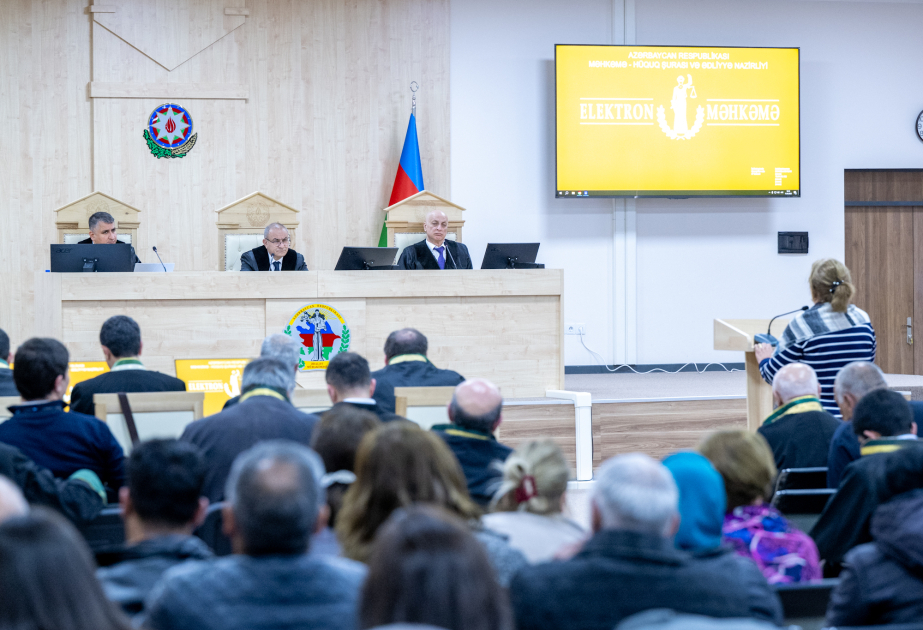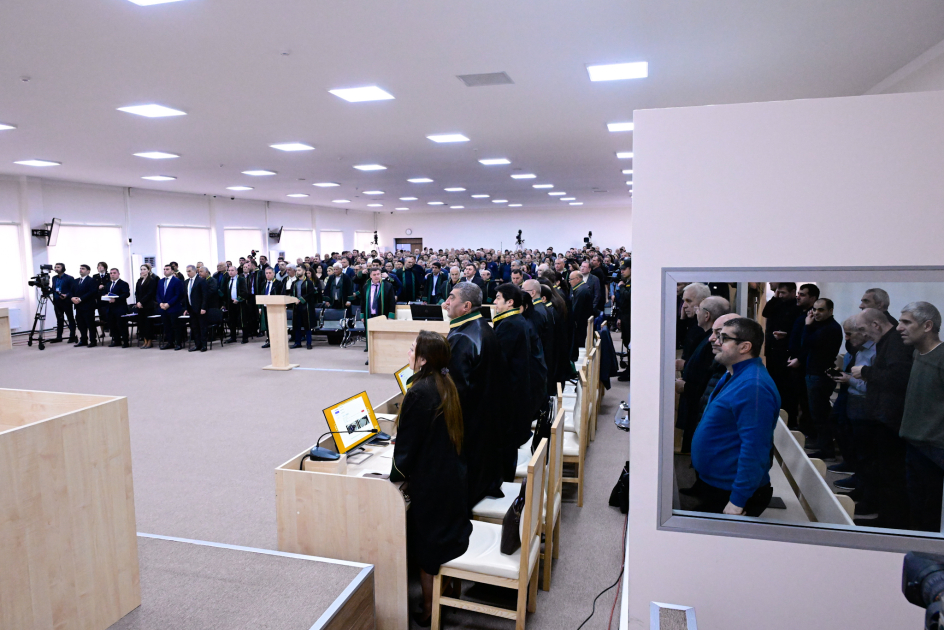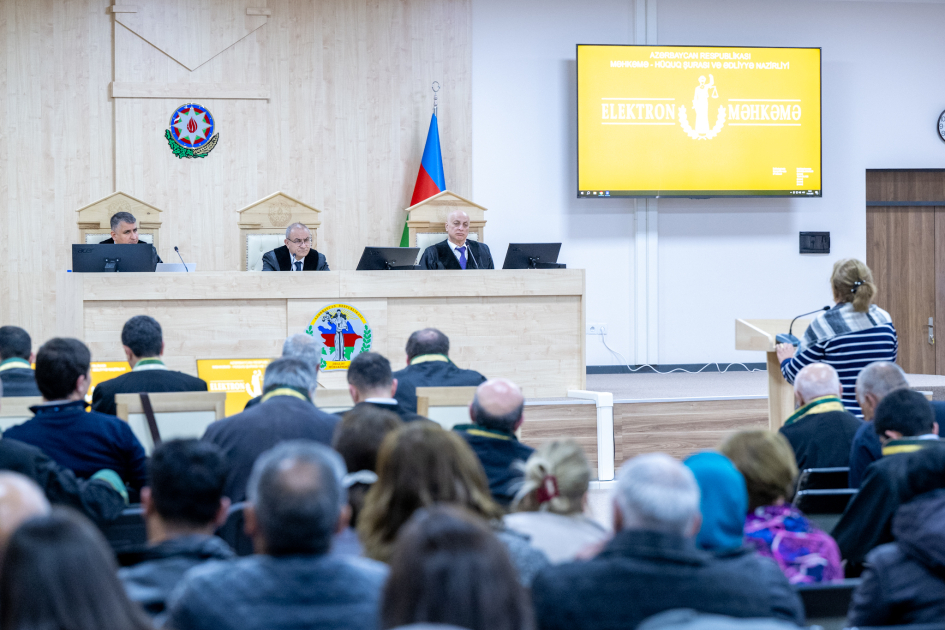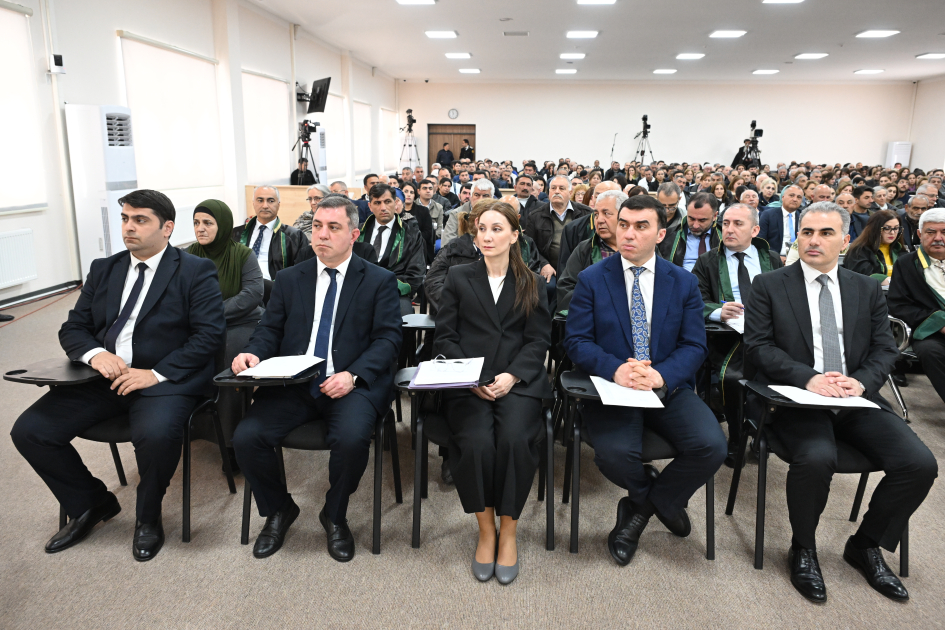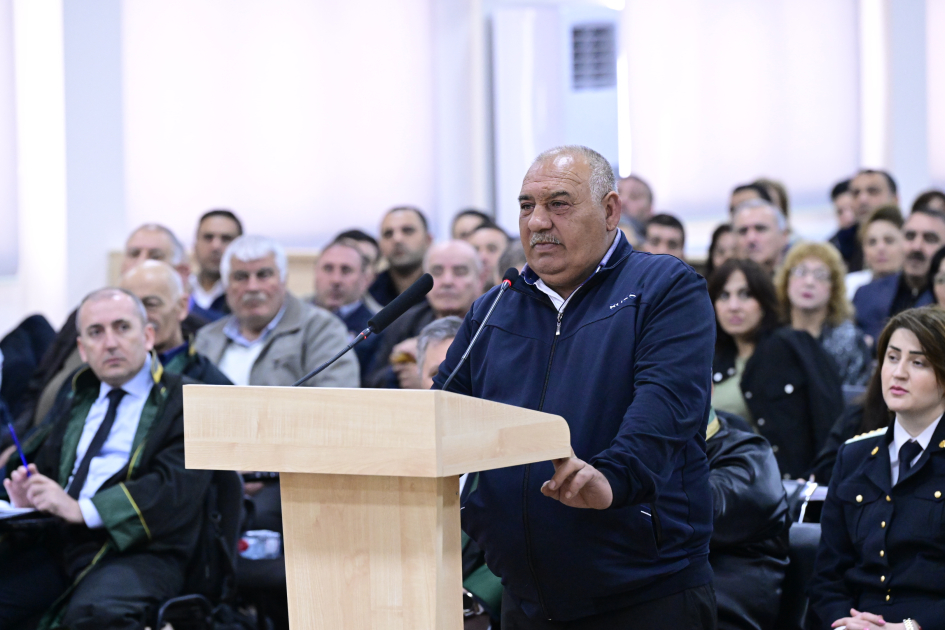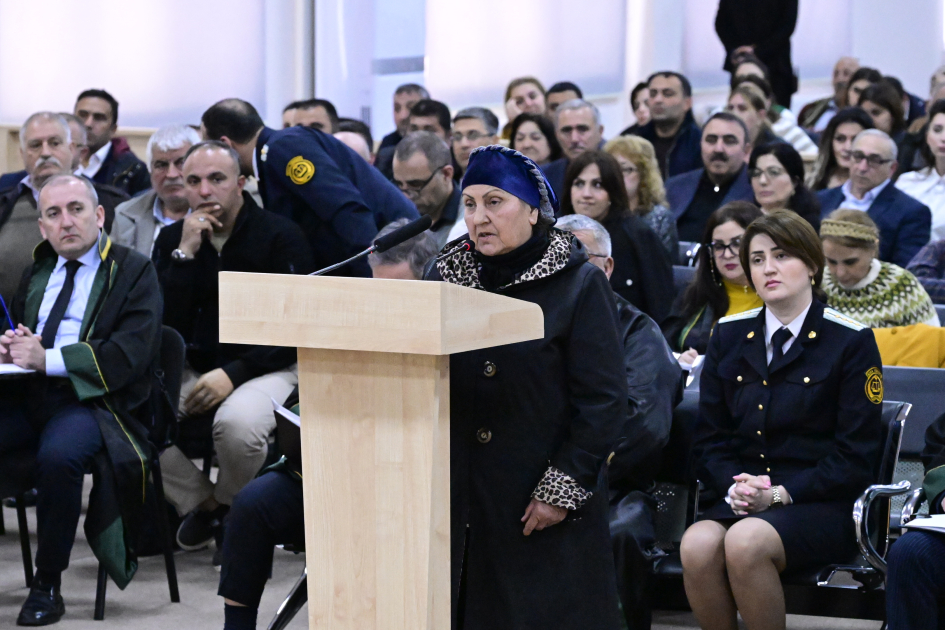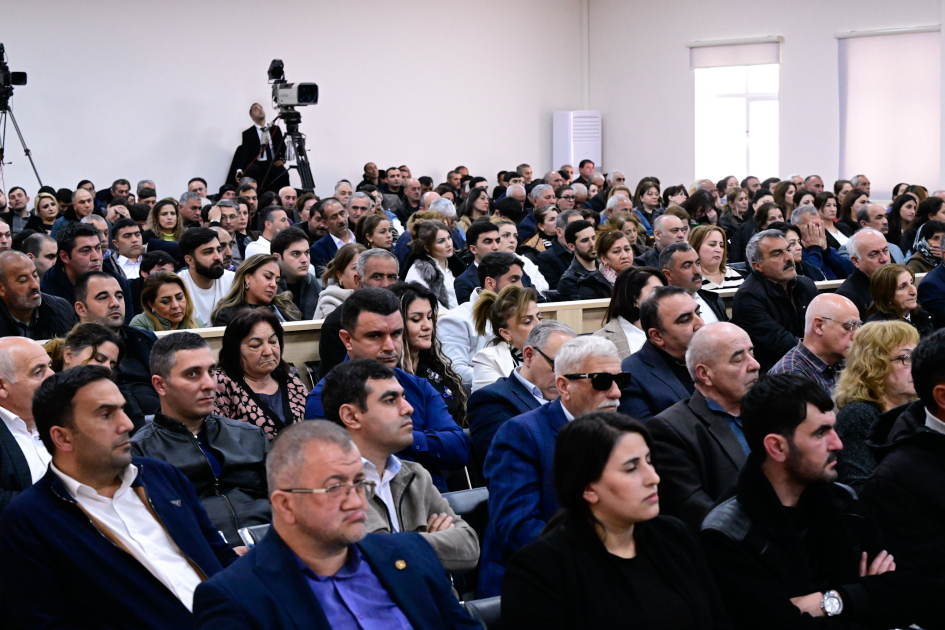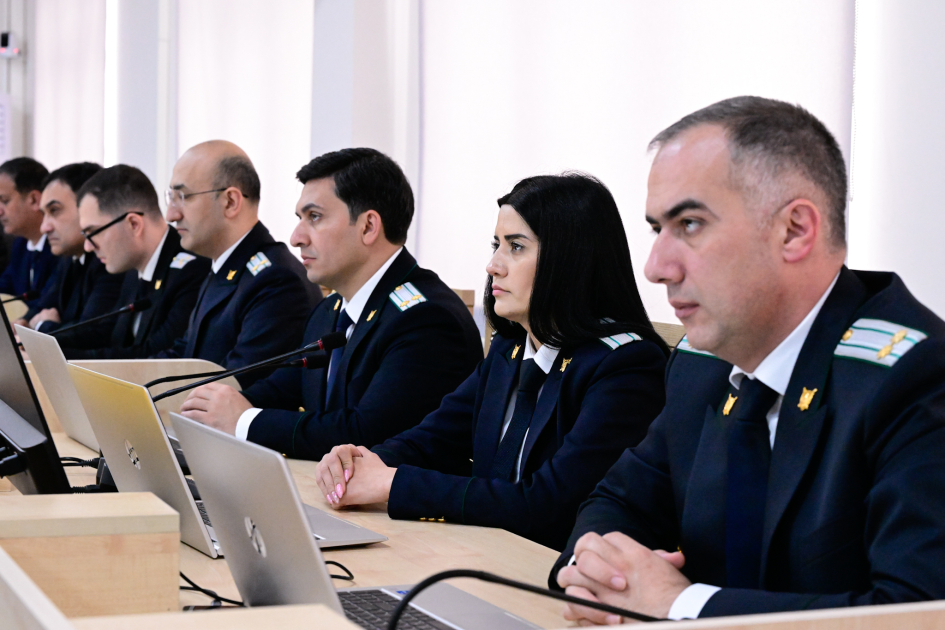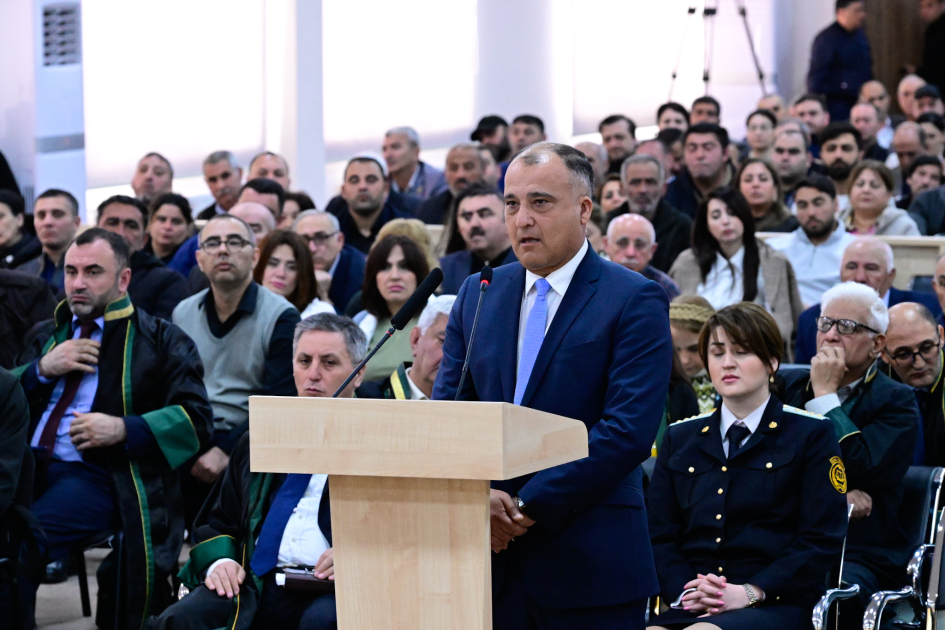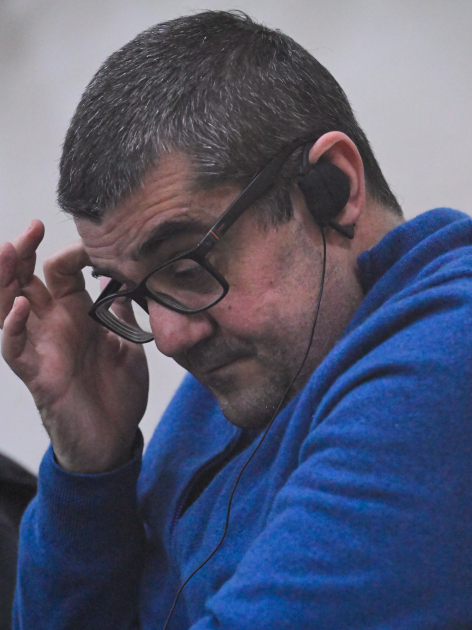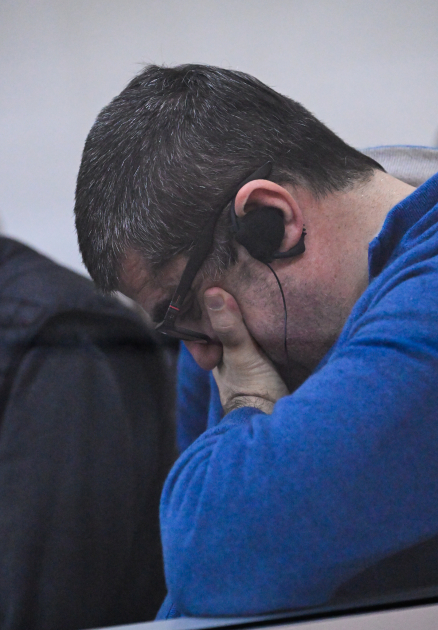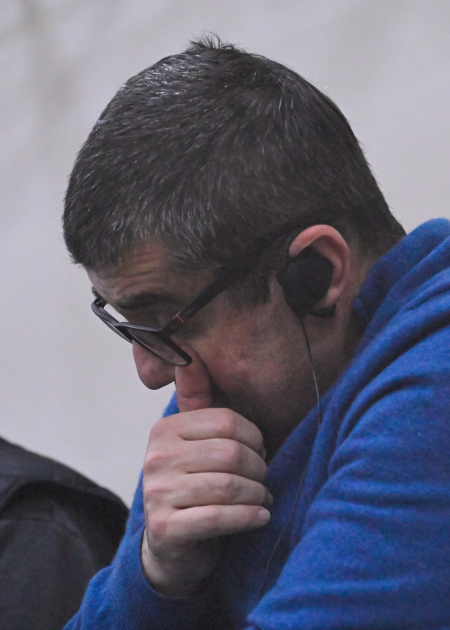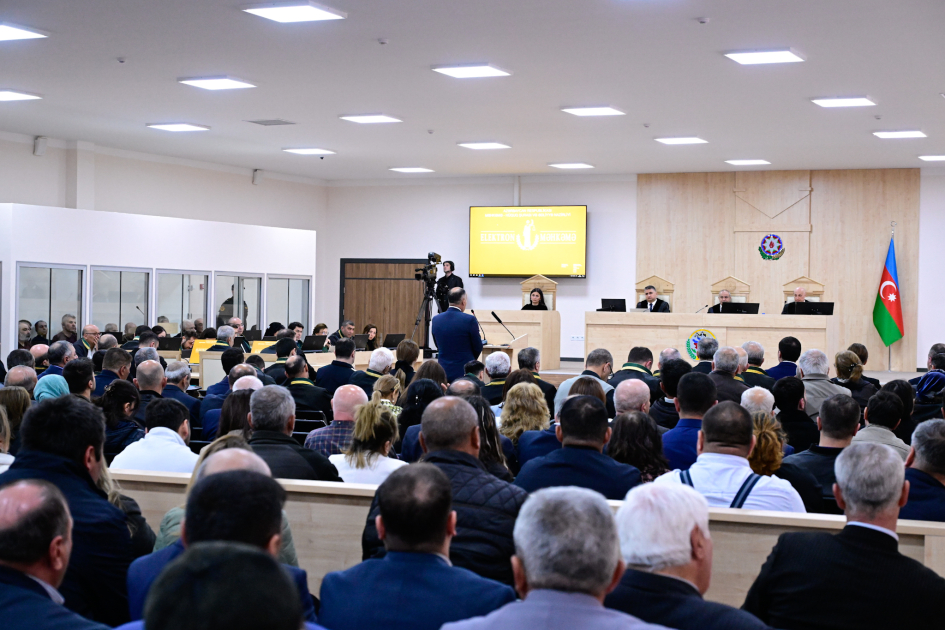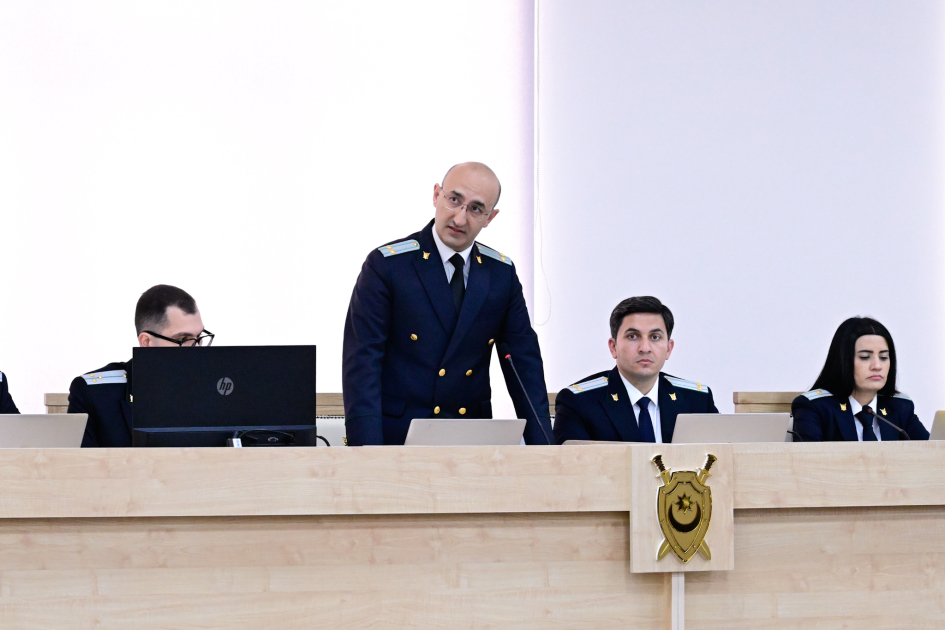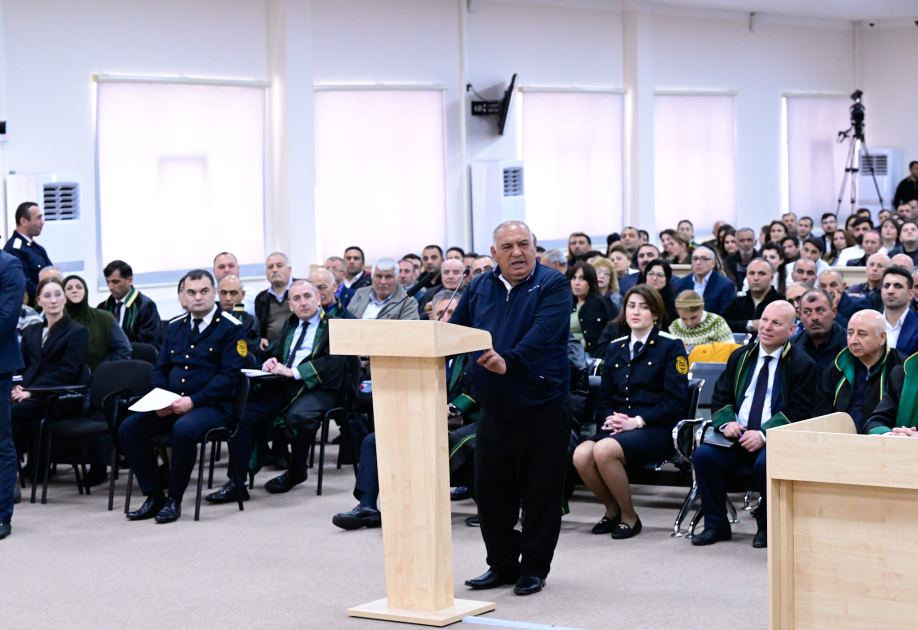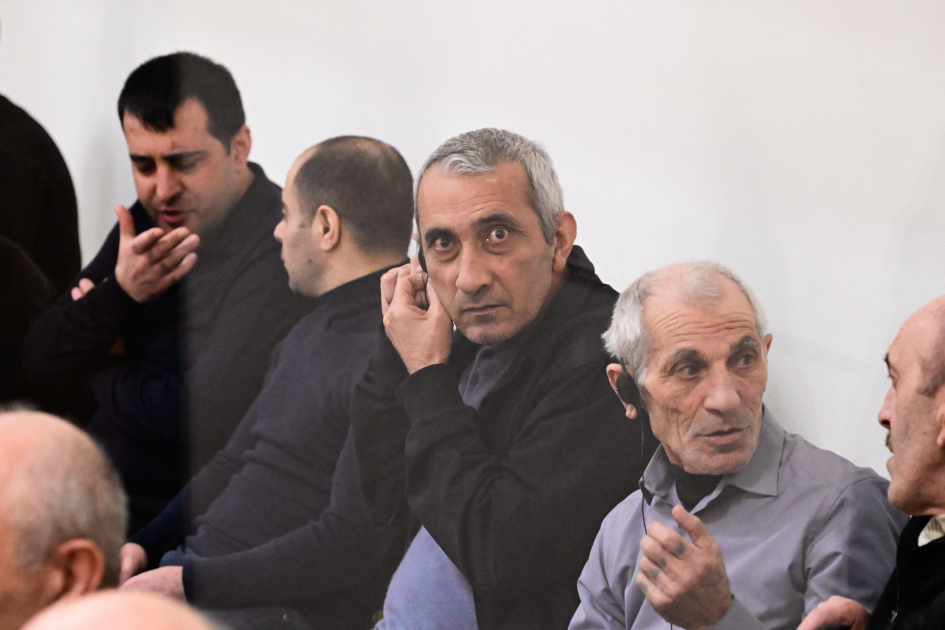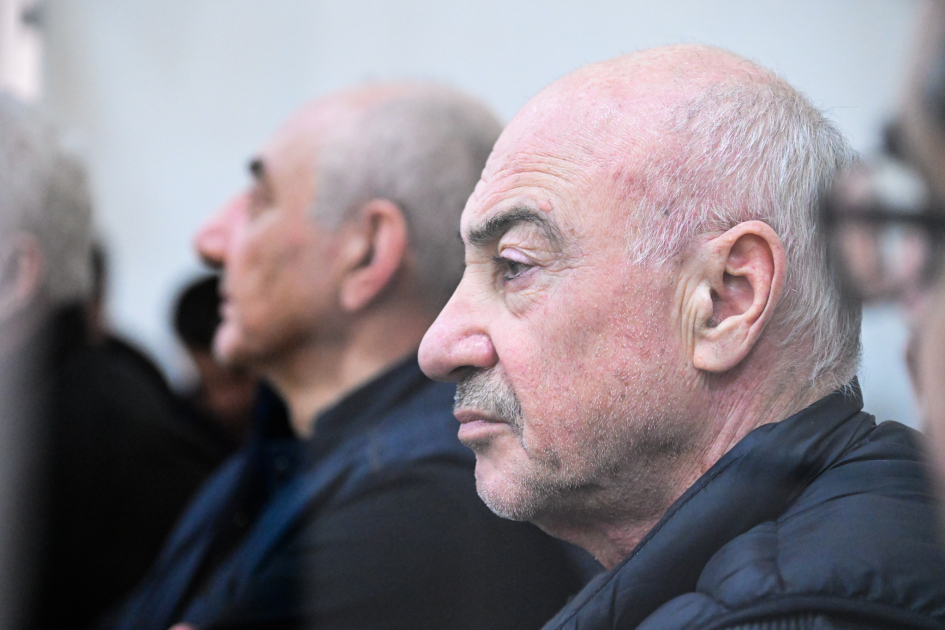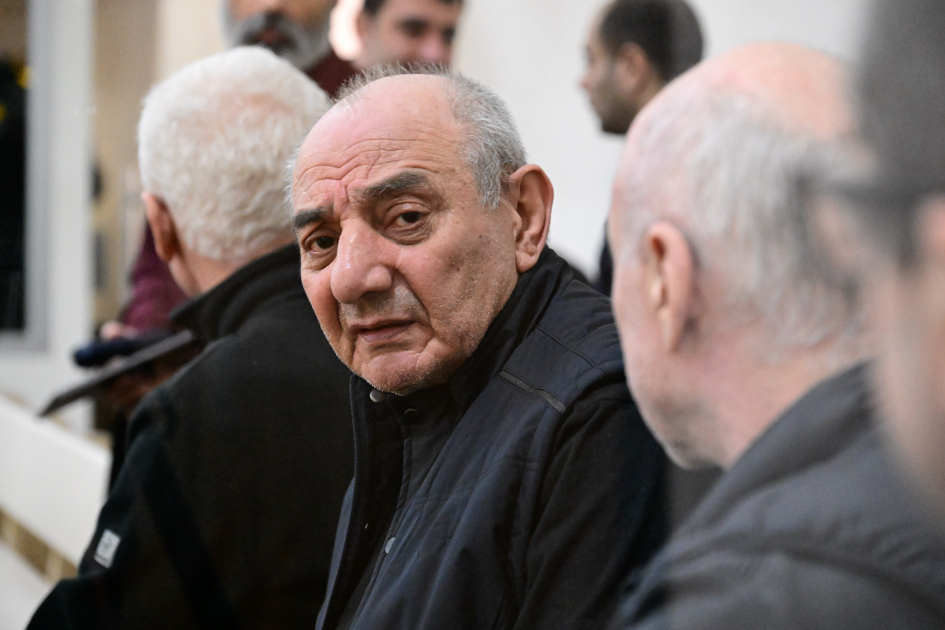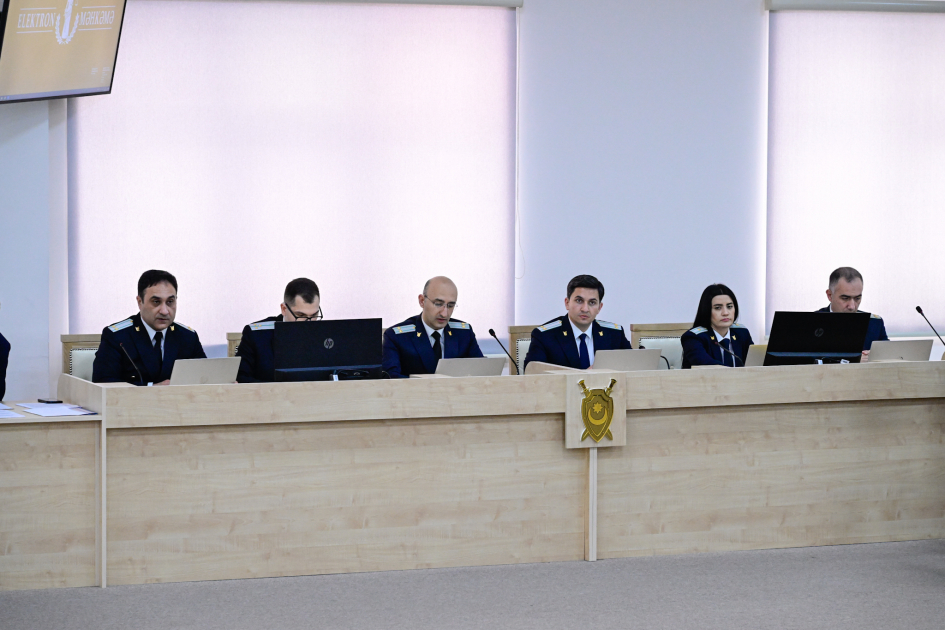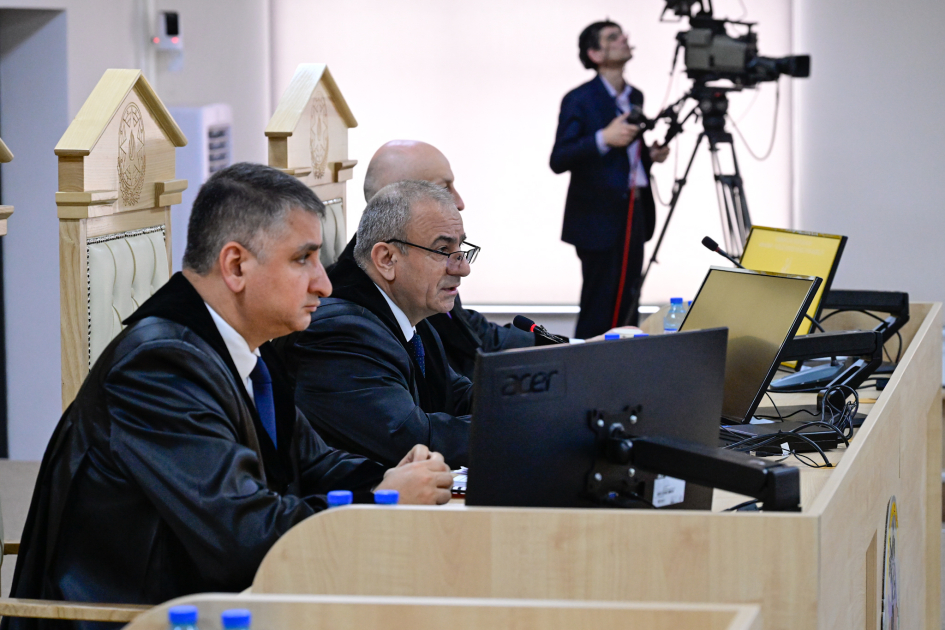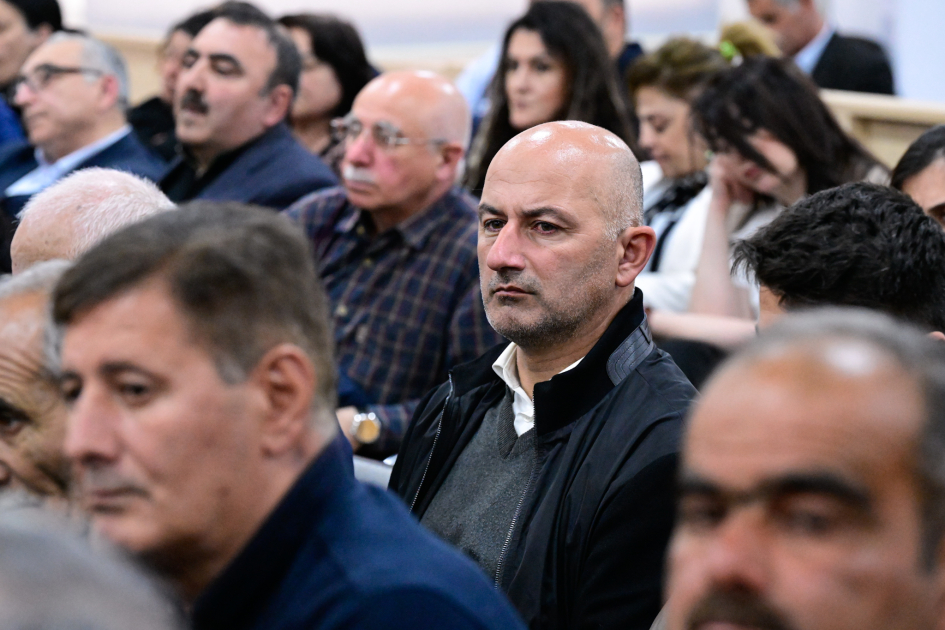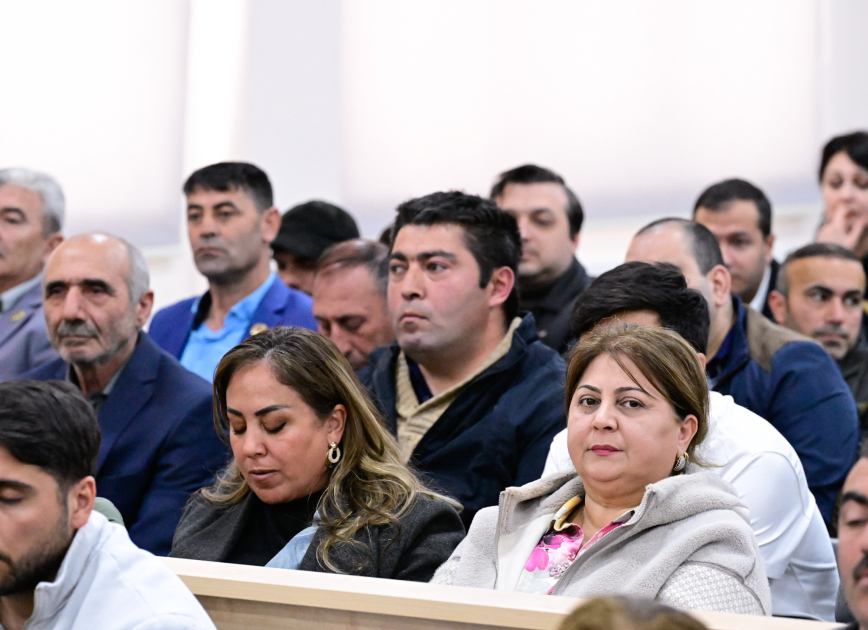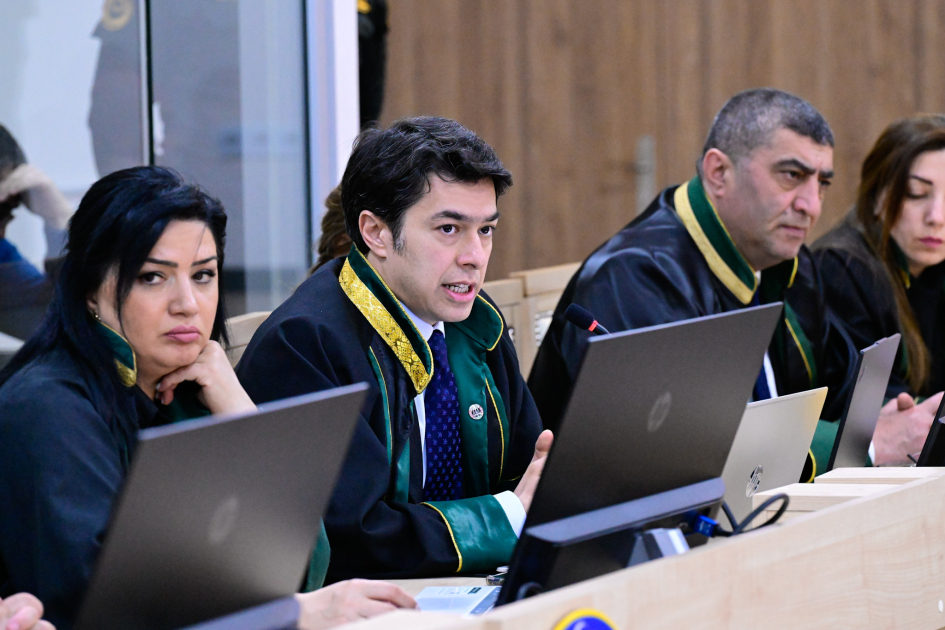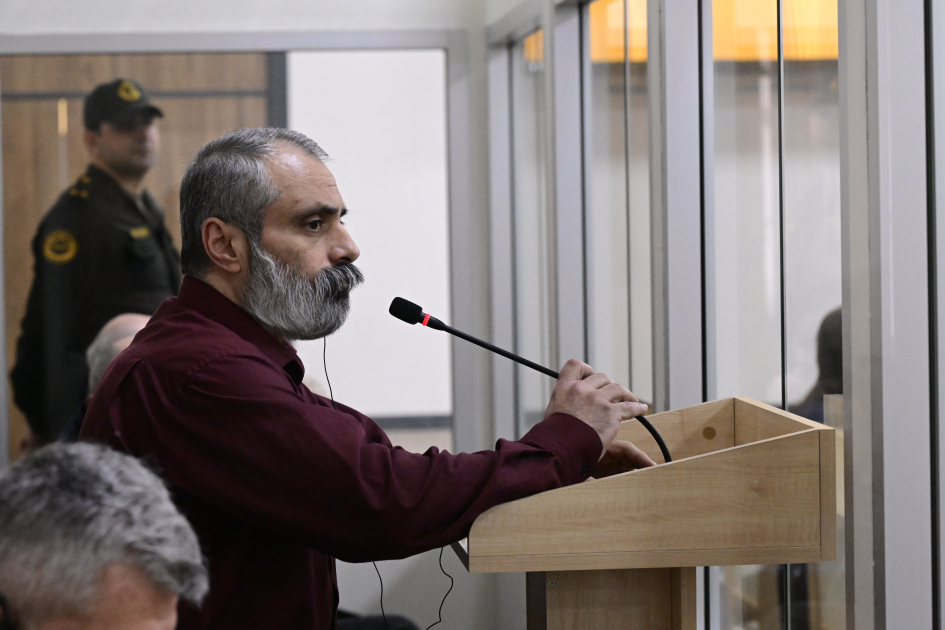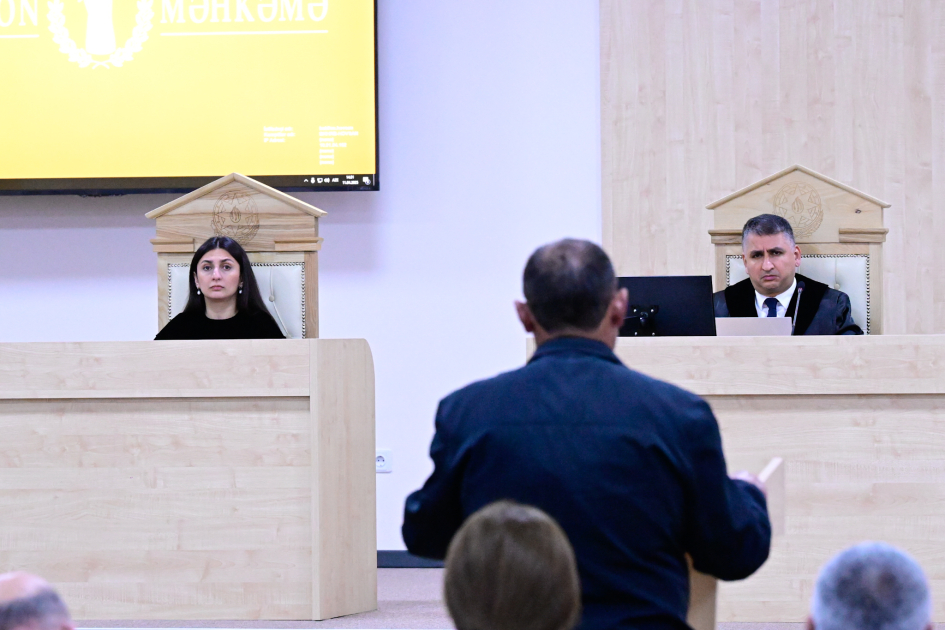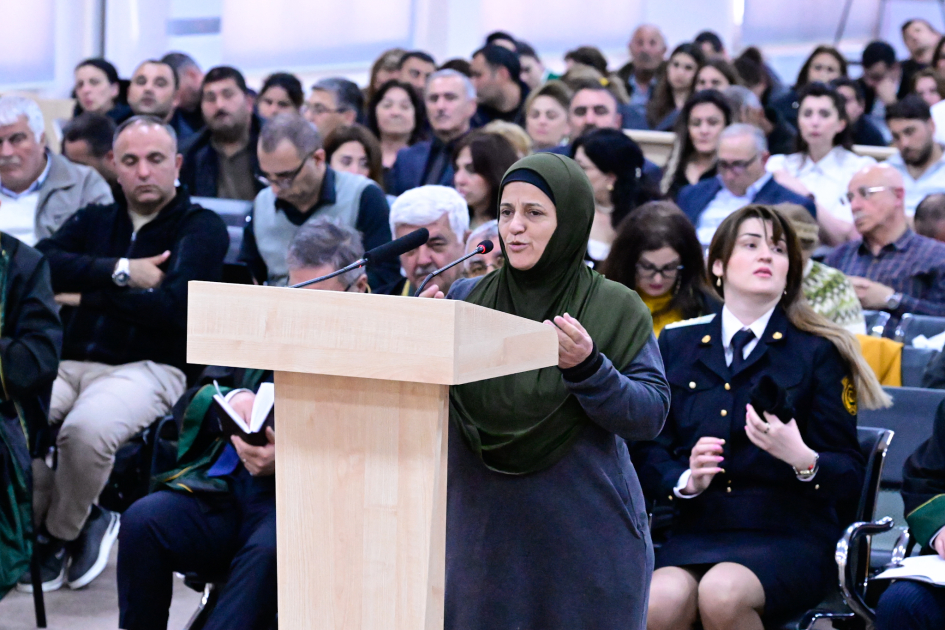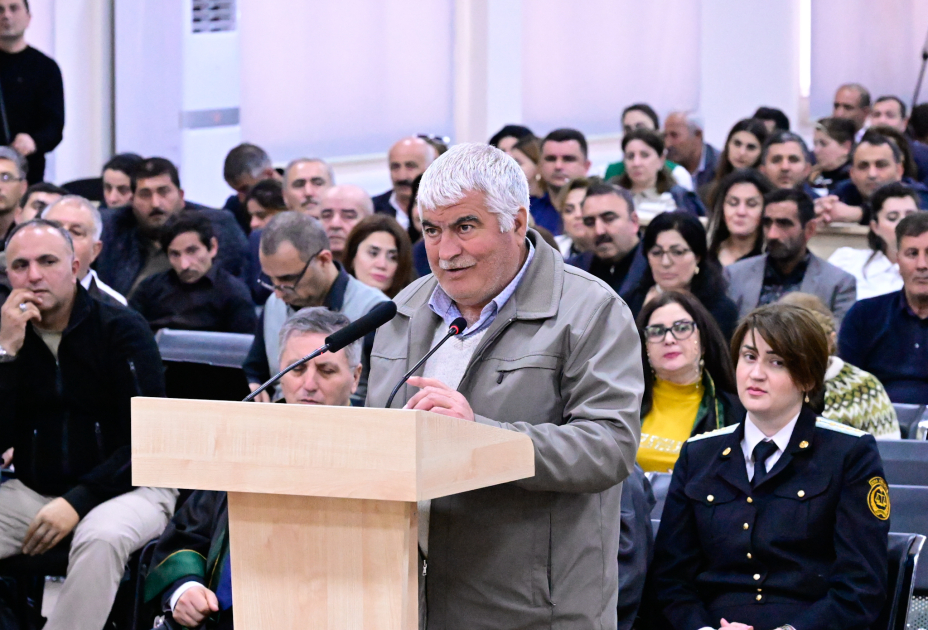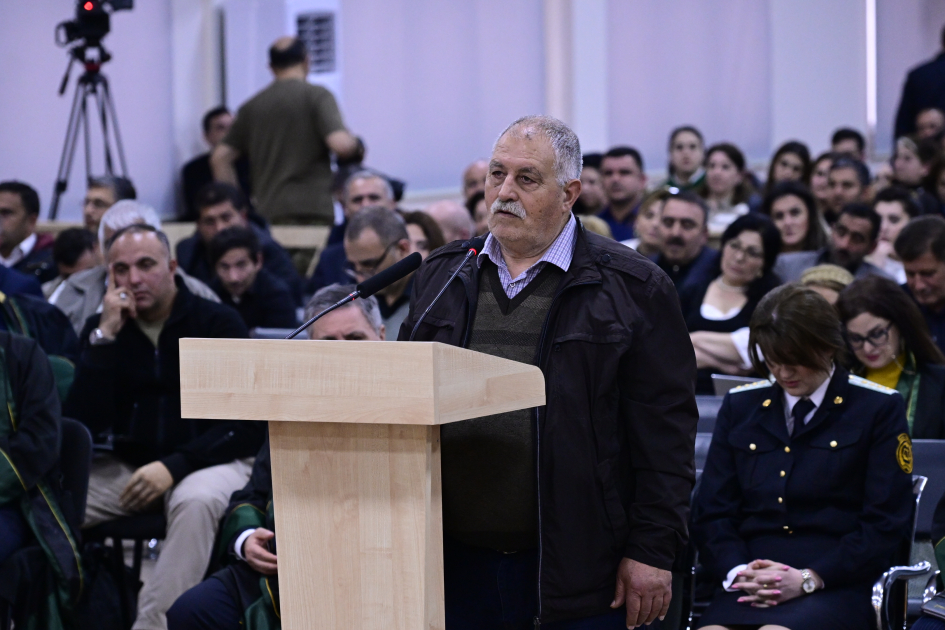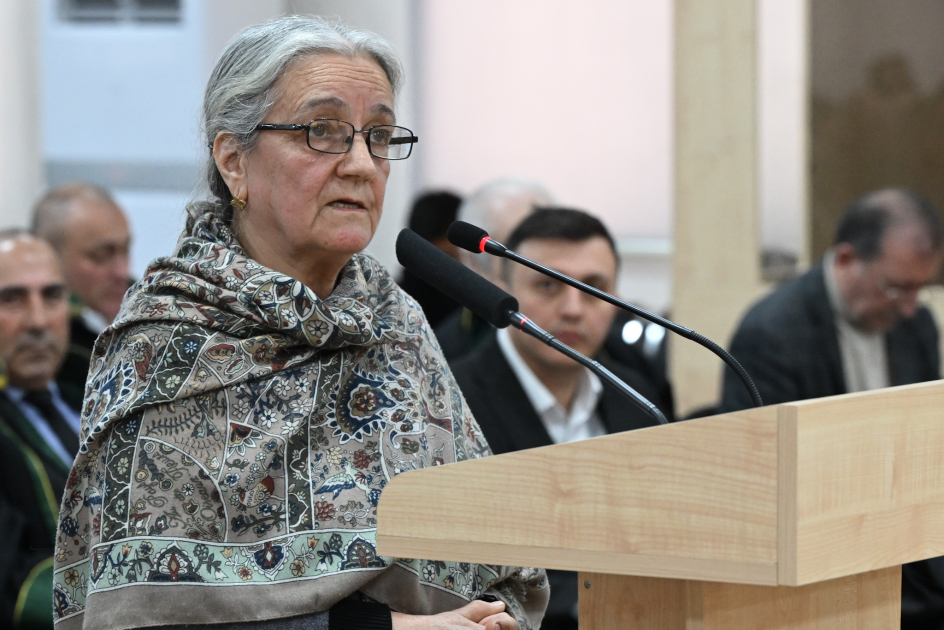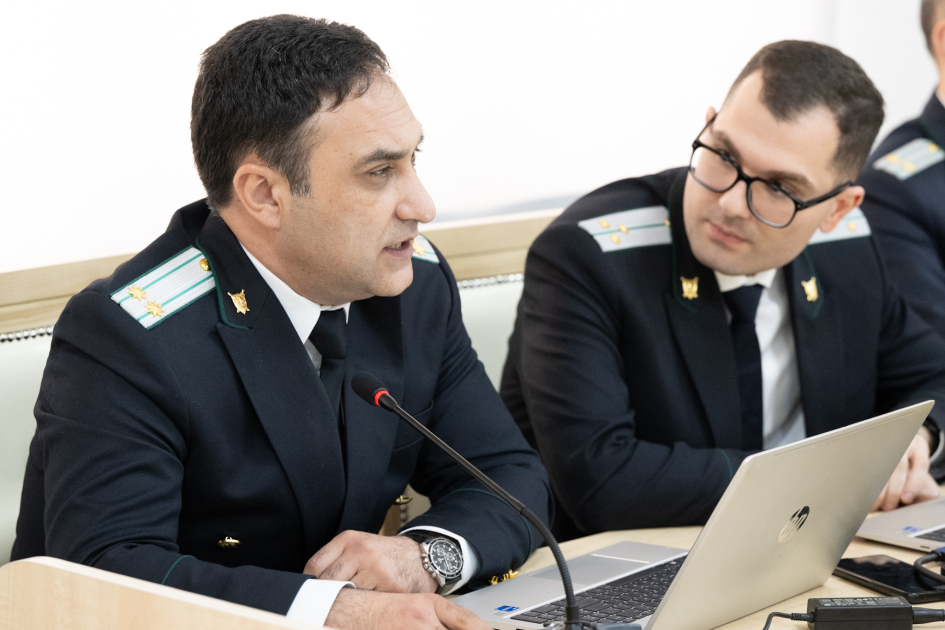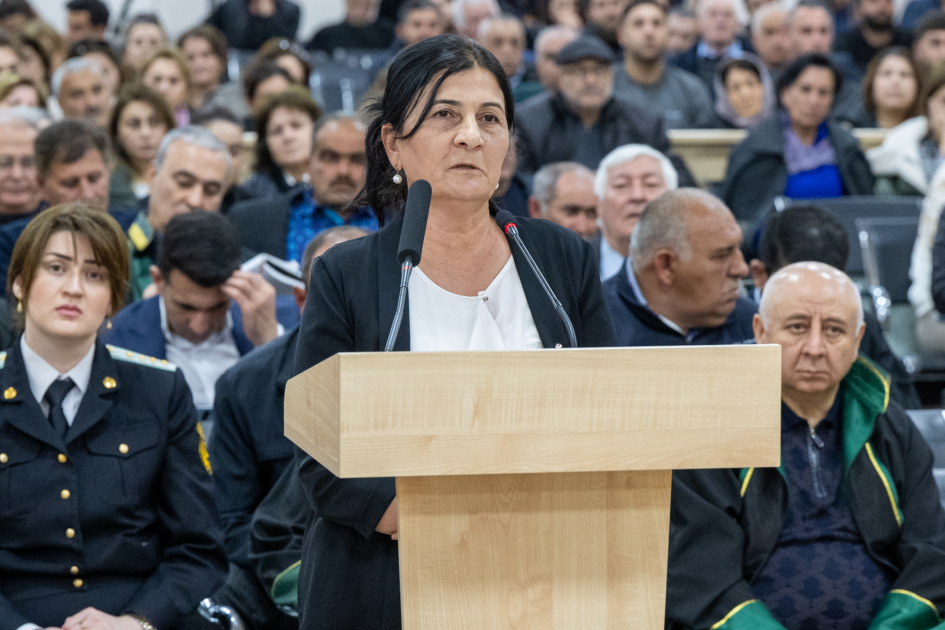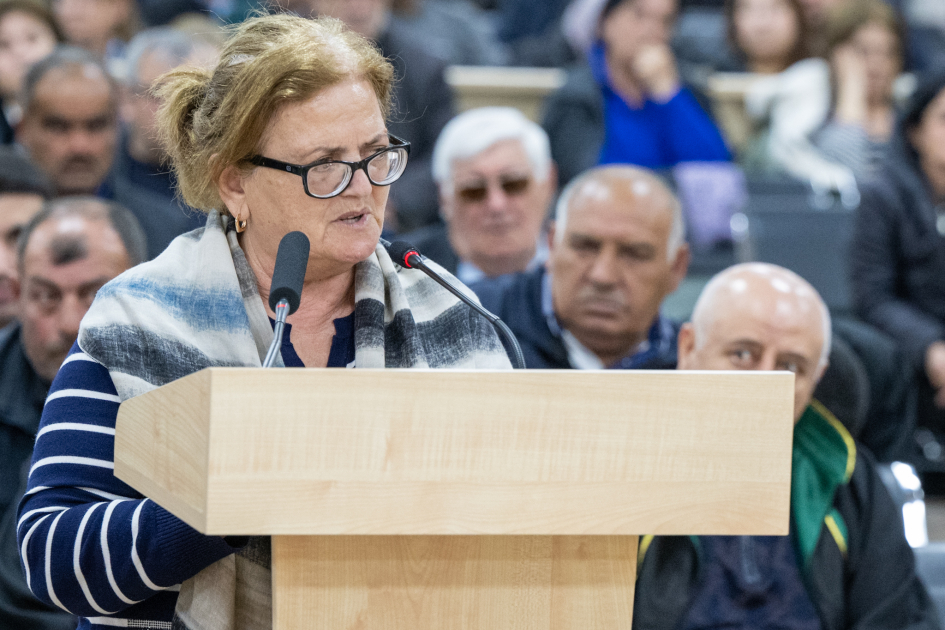Bakı. Trend:
Court hearings on the criminal case against citizens of the Republic of Armenia Arayik Harutyunyan, Arkadi Ghukasyan, Bako Sahakyan, Davit Ishkhanyan, Davit Babayan, Lyova Mnatsakanyan and others, who are accused of committing crimes against peace and humanity, war crimes, including the preparation and conduct of a war of aggression, acts of genocide, violation of the laws and customs of warfare, as well as terrorism, financing of terrorism, forcible seizure of power, forcible retention of power and numerous other crimes as a result of Armenia's military aggression, was continued on April 11, Trend reports.
The hearings held at the Baku Military Court were presided over by Judge Zeynal Aghayev and a panel consisting of Jamal Ramazanov and Anar Rzayev (reserve judge Gunel Samadova). Each of the accused was provided with an interpreter into the language of their choice, as well as defense attorneys.
Present at the review hearings were the accused and their defense attorneys, some of the victims, their legal successors and representatives, as well as prosecutors in charge of public prosecution.
Judge Zeynal Aghayev first explained to the victims participating in the process for the first time their rights and obligations stipulated by national legislation.
The victims first gave their own statements and then answered questions addressed to them by the prosecutors in charge of public prosecution, representatives of the victims and defense attorneys.
Victim Ahmad Ahmadov said in his testimony that there were 30 students in the class at the school he attended in Khankendi, 28 of whom were Armenian, one Russian and only he was Azerbaijani. He stated: “During my education – I can’t recall whether it was in the first, second or third grades – I was repeatedly insulted as an Azerbaijani. Even when there was a small conflict, they would call me a “tork, tork”. They would call Turks a “tork”. We were repeatedly insulted as Azerbaijanis and lived in an atmosphere of intolerance.
Everyone knows that whatever a student hears at home, they come and share that with classmates at school. It was 1986 and I was in the eighth grade. I had a classmate named Armen Beglaryan, who was sitting at the back desk. I saw him telling our classmate, “Gorbachev promised us that we would join Armenia. This was when I heard this political talk issues for the first time, but it seems like it happened yesterday.”
According to the victim, in January 1988, the hostility towards Azerbaijanis became obvious. He said: “For example, Azerbaijanis went to buy bread, but they were not given bread, they were pushed around everywhere. In February of that year, we heard that there would be a big rally. They said, ‘We are leaving Azerbaijan and joining Armenia’. We knew that some kind of provocation should be expected from the Armenians after the rally. They had brought people from Armenia for the rally. At that time, they were called ‘bearded’ and ‘militants’. We were hearing talk that they would destroy our houses, such rumors were floating around. Before that, the houses of Azerbaijanis were also stoned and their windows broken. We lived on the second floor. We had a neighbor named Karo on the first floor. He worked in the fire service in Asgaran. Karo and his brother Ararat were among the most active participants in these developments.
My elder sister had got married by then and moved to Aghdam. On February 20, I was visiting them in Aghdam. On February 21, I went from Aghdam to Khankendi. When I was returning home by car, I heard a sound on the bridge at the entrance to Asgaran district. It turned out that we were fired on. I was wounded in my arm. There were two more people in the car besides me and the driver. I found out later that their names were Ali and Bakhtiyar. They were in very serious condition. The driver took me to the Agdam hospital where the doctors said that they could remove the bullet, but my arm would not work. Let me say in advance that my right wrist did not work for about two years after that. From there, we went to the hospital in the city of Barda, where the doctors told me the same thing. On February 23, 1988, I was operated on at the Neurosurgery Hospital in Baku and the bullet was removed. Later, I heard that it was a policeman living in Asgaran who opened fire on us using a machine gun.”
Answering the questions of the Assistant to the Prosecutor General for Special Assignments, Tuqay Rahimli, the victim said that the attitude of the Armenians towards Azerbaijanis in Khankendi was never positive until 1988. He emphasized that the Azerbaijanis were bullied at every step in Khankendi. He said: “For example, they did not register any of the newly arriving Azerbaijanis. They did not give Azerbaijani arrivals a plot of land to build a house or register them if someone acquired property. They did all this to artificially reduce the Azerbaijani population and make it look small. After a match between “Neftchi” and “Ararat” football clubs, it was not possible to go outside. They would drink, use obscene language and smash windows. Let me tell you an episode from September 1987. There was an Azerbaijani family living in the upper neighborhood. When the son of that family went to buy bread, two Armenians beat him up quite badly, so he remained in a coma for more than a month. One of the Armenians was drunk.”
Victim Ahmad Ahmadov also spoke about the discrimination and pressure he had faced at one of the public events. “There was an event at the central stadium in Khankendi. I was in the seventh or eighth grade, so I went there too. There were about 2,000 students there. They recognized most of the Azerbaijanis by their facial features. During the event, among about 2,000 students, the Armenians put physical pressure on me, insulted me and made me leave the event venue.”
Ahmad Ahmadov said he currently lives and works in the city of Khankendi.
Then victim Nazeyka Atakishiyeva made a statement and answered questions. Nazeyka Atakishiyeva, who was born in the city of Khankendi in 1954 and lived there, said that the attitude of Armenians towards Azerbaijanis living in Khankendi was not good, but in February 1988 this attitude became even worse.
Nazeyka Atakishiyeva said that she had worked as a weaver at the Karabakh Silk Factory in Khankendi, that Robert Kocharyan supervised the lubrication of looms at that factory, then became the factory’s Komsomol secretary and was one of the main activists in the campaign against Azerbaijanis. “Starting in February 1988, when we left our jobs, bearded men were waiting for us. They were not from Khankendi,” she noted.
In response to questions from the Senior Assistant to the Prosecutor General, Vusal Aliyev, she said that she had been stoned and insulted by Armenians in front of her house. She said, “They were knocking on the door of our house, cursing and saying, ‘Get out of here, we will live here’. There was someone named Slavik in our building. He taught the local kids how to insult and stone us when we were coming home.”
“My niece had cramps and a high fever. We called an ambulance. The answer was, “If he has a fever, put him in the refrigerator, let him cool down, but don't call here again. This place is ours, we live here. In general, ever since the word “Miatsum” appeared, our lives went from bad to worse. An Armenian named Shahbazyan told my husband that it would be better if you left here once and for all,” she said.
In his testimony, victim Vugar Maharramov said that he was a resident of the village of Baghanis Ayrim of Gazakh district and that his house was attacked by Armenians in the early hours of March 24, 1990. “They came and destroyed our house and then set it on fire. After Armenian men had killed some and driven others out of their homes, Armenian women entered our empty houses and looted them. Then Armenian men burned and destroyed the looted houses. They collected all our livestock and took it away. My father had hidden us in the cattle shed. They gathered near our shed, clapping their hands and having fun. The next day, we found the burnt body of my father Alimammad Maharramov under the haystack. We collected my father’s bones and buried them in the village. That’s when we left the village,” he said.
The victim added that the attackers were referred to as “Semyon's gang”. He noted: “The ones who came were armed men dressed in military uniforms. Women were in civilian clothes, and they were looting the houses.”
Vugar Maharramov said that a baby was among those killed. “They brought a gasoline truck with them. They took gasoline from it and poured it over the houses before they set them on fire,” he added.
Victim Ramiz Adigozalov also said that he was a resident of the village of Baghanis Ayrim. He said that in the early hours of March 24, 1990, his 39-day-old baby Hafiz Adigozalov, his wife Aliya Adigozalova and other relatives were killed and burned by Armenians.
Speaking about the incident, the victim said that a large number of Armenian soldiers had come to the village. First, their women were looting the houses and then men set them on fire. He noted that six villagers and a police officer were burned alive on that day. Among those killed were his father-in-law, mother-in-law and sister-in-law.
Victim Aida Gurbanova said that in the early hours of March 24, 1990, Armenians wounded her husband Ziraddin Ahmadov, who was a police inspector and senior lieutenant.
Then the prosecutors in charge of public prosecution showed video and photo materials on the episode of the destruction of the village of Baghanis Ayrim.
When the footage of the burned bodies was shown, some of the victims present felt unwell and had to leave the courtroom.
The accused Arayik Harutyunyan, also watching the footage, acted as if he was moved.
The video and photo materials also showed the burned bodies of Ramiz Adigozalov’s 39-day-old son Hafiz Adigozalov, and his wife Aliya Adigozalova.
Victim Zemfira Abbasova said that after the start of the “Miatsum” movement in the city of Khankendi, they could not go outside. “Although very good conditions were created for Armenians and they were very well provided for, they insulted and put pressure on us. They entered our houses, looted and destroyed them, damaged our property, and left the signs of crosses on it. We could not go outside because they would stone us. They would not even sell us bread,” she said.
Answering the questions of the head of the Department of the Public Prosecution of the Prosecutor General's Office, Nasir Bayramov, the victim noted that she had worked in the railway department at the time. “They would come to this department and commit various illegal acts against us. They mainly said, ‘Turks should not be here, they should leave here, Turks should be killed’. They demanded that the Turks leave and that Armenians settle in our houses,” she noted.
Victim Valida Rasulova said in her testimony that her husband had been shot by Armenians in the Karkijahan settlement on September 18, 1988 and that they took him to the Shusha hospital through roundabout routes. She said: “The Armenians attacked us while we were sitting in our house. They tortured and killed an Azerbaijani named Farhad Agakishiyev.”
Victim Farida Huseynova said that she had worked at a silk factory in Khankendi. She noted, “The head of the shop was an Armenian named Rachik. He said that this is Armenia, get out and leave. He told me, ‘Farida, I want you to be taken hostage. I will then push this eye of yours and make the other one come out.’ They would turn off the machines so that we could not work.”
Answering the questions of public prosecutor Vusal Abdullayev, she said: “They were pressuring us into leaving our houses. Almost all our family members were wounded during the events.”
Victim Adalat Valiyev said in his testimony that he was born in the village of Karki in Sharur district (now this village is part of Sadarak district - ed.). He said that the village was located in a strategic position on the Yerevan-Gorus road. He noted, “Even during the Soviet era, the Armenians wanted to seize the village. They told the elders to come and write a petition to cede the village to us. Our village was surrounded by Armenian villages on all sides. When we passed through there, they stoned our cars and blocked our way. We could only travel to and from our village accompanied by Russian soldiers. For a while, we even traveled by helicopter. Then even that became impossible, as people had to go to the village not by road, but through the mountains.”
Answering the questions of public prosecutors Fuad Musayev and Tarana Mammadova, the victim noted that at around 6-7 am on January 15, 1990, Armenian armed groups attacked Karki, surrounded the village from all sides, and burned down the shop and some houses in the village. Several people were wounded during the incident. “The Russian commander said to us, ‘You should leave, if you stay here, they will destroy the village. Leave, we will protect the village, then you will return’. We left, and two days later we heard that the village had been looted.”
Victim Ali Isgandarov also said that he was born in the village of Karki and confirmed what Adalat Valiyev had said before him. He said, “They fired on us from the Armenian side every night until January 15.”
The victims asked the court to hand down the most severe punishment for the accused.
The next court hearing is scheduled for April 14.
We recall that a total of 15 Armenian nationals are being charged with numerous crimes involving direct leadership and participation of the Armenian state, its state bodies, military forces and illegal armed formations, verbal and written instructions, orders and assignments, provision of material and technical support, central governance, as well as the exercise of rigorous control, with the aim of committing military aggression and acts of terror against the Republic of Azerbaijan in the territory of Azerbaijan in violation of domestic and international law, and involving Robert Sedraki Kocharyan, Serzh Azati Sargsyan, Vazgen Mikaeli Manukyan, Vazgen Zaveni Sargsyan, Samvel Andraniki Babayan, Vitali Mikaeli Balasanyan, Zori Hayki Balayan, Seyran Mushegi Ohanyan, Arshavir Surenovich Garamyan, Monte Charles Melkonyan and others, including criminal acts committed during the course of the war of aggression waged by the aforementioned criminal group.
The said persons, i.e. Arayik Vladimiri Harutyunyan, Arkadi Arshaviri Ghukasyan, Bako Sahaki Sahakyan, Davit Rubeni Ishkhanyan, David Azatini Manukyan, Davit Klimi Babayan, Levon Henrikovich Mnatsakanyan, Vasili Ivani Beglaryan, Erik Roberti Ghazaryan, Davit Nelsoni Allahverdiyan, Gurgen Homeri Stepanyan, Levon Romiki Balayan, Madat Arakelovich Babayan, Garik Grigori Martirosyan, Melikset Vladimiri Pashayan, are being charged under Articles 100 (planning, preparing, initiating and waging a war of aggression), 102 (attacking persons or organizations enjoying international protection), 103 (genocide), 105 (extermination of the population), 106 (enslaving), 107 (deportation or forced displacement of the population), 109 (persecution), 110 (enforced disappearance of people), 112 (deprivation of liberty contrary to international law), 113 (torture), 114 (mercenary service), 115 (violation of the laws and customs of warfare), 116 (violation of international humanitarian law during armed conflict), 118 (military robbery), 120 (intentional murder), 192 (illegal entrepreneurship), 214 (terrorism), 214-1 (financing terrorism), 218 (creation of a criminal association (organization)), 228 (illegal acquisition, transfer, sale, storage, transportation and possession of weapons, their components, ammunition, explosives and devices), 270-1 (acts threatening aviation security), 277 (assassination of a state official or public figure), 278 (forcible seizure and retention of power, forcible change of the constitutional structure of the state), 279 (creation of armed formations and groups not provided for by law) and other articles of the Criminal Code of the Republic of Azerbaijan.

